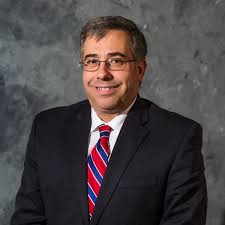Greetings! I’m Fred Zaspel, and welcome back to Books At a Glance as we highlight the events, players, and issues of the Protestant Reformation of the 16th century. Today we talk again with Dr. Andre Gazal who will take up a very specific question about the beginnings of the Reformation in England.
Andre, great to have you back.
Gazal:
Good to be back, Fred; thank you.
Zaspel:
There is evidently some question as to exactly when the English Reformation took place. Before we get into it, would you just explain the question for us?
Gazal:
Well, the question has to do with whether or not the English Reformation started with the Lollard movement, most often associated with Wycliffe, back to the fourteenth century. The question has to do with whether the Reformation started there or just simply started in the sixteenth century, mainly as the result of ecclesiastical initiatives taken by Henry VIII, specifically with reference to his request of an annulment from Catherine of Aragon.
Zaspel:
Why would you argue that the English Reformation began during the reign of Henry VIII?
Gazal:
Because, first of all, I would say that there is no evidence of direct influence by the Lollards by the time we get into the sixteenth century. As a matter of fact, the Lollards are very much proscribed by this time. They are outlawed and very much out of the picture, for one thing, so they are no longer exercising any major influence on the religious life of England. Also, much recent scholarship has maintained, and I think rightfully so, on the basis of very solid evidence, that traditional religion in England at the beginning of the 16th century was actually flourishing and quite thriving. Regardless of what Foxe and some in the early twentieth century would have alleged, and most recently, A. G. Dickens.
Zaspel:
What was flourishing? Traditional religion – do you mean traditional in England?
Gazal:
Late medieval Catholicism.
Zaspel:
Okay, that’s what I thought you meant.
Gazal:
What I mean by that, is that most people, from what the evidence seems to suggest, were very content with the piety they had known through late medieval Roman Catholic devotion.
Zaspel:
What are the four major views of the nature of the English Reformation, which one do you hold, 7and why?
Gazal:
One view is that the Reformation in England was a swift Reformation from above. By that we mean that the Reformation was the intended result of forceful government action and was something that was arbitrarily imposed on the country at large during the reigns of Henry VIII and Edward VI, and then later on, Elizabeth. That’s one view.
The second view is that it was a rapid Reformation from below. This view argues that while Protestant clerics were important in promoting change, the religious transformation of England was the result of effective evangelism by the laity at the grassroots level. This theory maintains that this environment was thoroughly prepared by the work of the Lollards.
The third view is that it was a slow Reformation from below. This view emphasizes a much more gradual pace of Protestantism at the local level. Probably one of the chief advocates of this view is the late Patrick Collinson.
Finally, the fourth view is that there was a slow Reformation from above. This is set forth by a growing body of scholars. According to this view the new religion, Protestantism or Evangelicalism, was forcefully imposed from above by the authorities, but gained only a small acceptance.
My view of this would largely be this last view, but it’s nuanced. I would say it was a slow Reformation from above in the sense that it was officially initiated by Henry VIII, continued by Edward, and then furthered by Elizabeth. The evidence shows that in terms of the country as a whole, there is an acceptance of Protestantism by the population, as a whole, but it’s a slow acceptance because of reluctance to give up their traditional devotion. Here’s how I would nuance it. I would hold to this fourth view, that it was a slow Reformation from above, but it was one in which an Evangelical Reformation, that was initiated by people such as Tyndale, and so forth, was fused with the official one during the reign of Edward VI.
Zaspel:
Are these views necessarily mutually exclusive?
Gazal:
I don’t think so.
Zaspel:
You do have different things going on at various levels, right?
Gazal:
Oh, definitely. Which makes the Reformation in England a very complex phenomenon, even to the point where some scholars have spoken of it in terms of English Reformations, rather than simply one Reformation.
Zaspel:
We’re talking to Dr. Andre Gazal about the English Reformation. Next time he’ll be back with us, talking about John Jewel and his part in the Reformation in England. Thanks for listening in.
